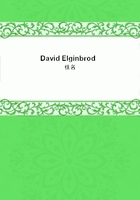
第3章
Concord between our wit and will Where highest notes to godliness are raised, And lowest sink not down to jot of ill.
What Languetus taught Sir Philip Sidney.
THE ARCADIA--Third Eclogue.
The House of Turriepuffit stood about a furlong from David's cottage. It was the abode of the Laird, or landed proprietor, in whose employment David filled several offices ordinarily distinct.
The estate was a small one, and almost entirely farmed by the owner himself; who, with David's help, managed to turn it to good account.
Upon week-days, he appeared on horseback in a costume more fitted for following the plough; but he did not work with his own hands;and on Sundays was at once recognizable as a country gentleman.
David was his bailiff or grieve, to overlook the labourers on the estate; his steward to pay them, and keep the farm accounts; his head gardener--for little labour was expended in that direction, there being only one lady, the mistress of the house, and she no patroness of useless flowers: David was in fact the laird's general adviser and executor.
The laird's family, besides the lady already mentioned, consisted only of two boys, of the ages of eleven and fourteen, whom he wished to enjoy the same privileges he had himself possessed, and to whom, therefore, he was giving a classical and mathematical education, in view of the University, by means of private tutors; the last of whom--for the changes were not few, seeing the salary was of the smallest--was Hugh Sutherland, the young man concerning whom David Elginbrod has already given his opinion. But notwithstanding the freedom he always granted his daughter, and his good opinion of Hugh as well, David could not help feeling a little anxious, in his walk along the road towards the house, as to what the apparent acquaintance between her and the new tutor might evolve; but he got rid of all the difficulty, as far as he was concerned, by saying at last:
"What richt hae I to interfere? even supposin' I wanted to interfere. But I can lippen weel to my bonny doo; an' for the rest, she maun tak' her chance like the lave o's. An' wha' kens but it micht jist be stan'in' afore Him, i' the very get that He meant to gang. The Lord forgie me for speakin' o' chance, as gin I believed in ony sic havers. There's no fear o' the lassie. Gude mornin' t'ye, Maister Sutherlan'. That's a braw beuk o' ballants ye gae the len' o' to my Maggy, this mornin', sir."Sutherland was just entering a side-door of the house when David accosted him. He was not old enough to keep from blushing at David's words; but, having a good conscience, he was ready with a good answer.
"It's a good book, Mr. Elginbrod. It will do her no harm, though it be ballads.""I'm in no dreed o' that, sir. Bairns maun hae ballants. An', to tell the truth, sir, I'm no muckle mair nor a bairn in that respeck mysel'. In fac, this verra mornin', at the beuk, I jist thocht Iwas readin' a gran' godly ballant, an' it soundet nane the waur for the notion o't.""You should have been a poet yourself, Mr. Elginbrod.""Na, na; I ken naething aboot yer poetry. I hae read auld John Milton ower an' ower, though I dinna believe the half o't; but, oh! weel I like some o' the bonny bitties at the en' o't.""Il Penseroso, for instance?"
"Is that hoo ye ca't? I ken't weel by the sicht, but hardly by the soun'. I aye missed the name o't, an' took to the thing itsel'.
Eh, man!--I beg yer pardon, sir--but its wonnerfu' bonny!""I'll come in some evening, and we'll have a chat about it," replied Sutherland. "I must go to my work now.""We'll a' be verra happy to see you, sir. Good mornin', sir.""Good morning."
David went to the garden, where there was not much to be done in the way of education at this season of the year; and Sutherland to the school-room, where he was busy, all the rest of the morning and part of the afternoon, with Caesar and Virgil, Algebra and Euclid; food upon which intellectual babes are reared to the stature of college youths.